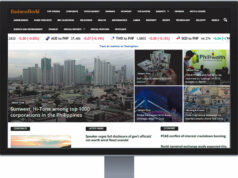For better or for worse: Duterte as disruptor
By Camille A. Aguinaldo
Reporter
PRESIDENT Rodrigo R. Duterte as disruptor has been quite a running theme by now, two years into his administration. But above all, this theme is a tangible reality being felt by the country — by its citizenry and its stakeholders — whether one considers the body count in the drug war or the presidential pronouncements almost out of the blue that have led to disruption here and there in the business community.
From Gina L. Lopez’s shaking up the mining industry at the outset of Mr. Duterte’s presidency, to the Roberto V. Ongpin-Philweb episode, and to the much-anticipated third player in the telecommunications industry, this presidency has been a weighty factor among businessmen.
“In the past years, the Philippines was governed by politicians who vowed to foster change but left Filipinos burdened by similar concerns they had decades ago,” presidential spokesperson Harry L. Roque, Jr. told BusinessWorld through a text message. “The last thing our country needs is the same brand of leaders who promise the world but fail to deliver. What the Philippines needs is someone who is not afraid to get things done for the people, even if this means he has to “disrupt” an entire system of government.”
The Duterte administration had been cautious, but is now picking up momentum on the “endo” labor issue, whereas on his latest environmental cause, Boracay — that has plainly disrupted tourism in the island — Mr. Duterte can be seen to be sudden and almost brash in his enforcement of the island’s rehabilitation. One assumes that business is on alert as to what lies ahead in the long remainder of his term, apart from the possibilities in store amid the planned transition to federalism.
But the air of concern earlier expressed by the business community in the early days of this administration have transitioned into warmness as Mr. Duterte pursued relations beyond Western countries.
“On foreign relationships, he opened more avenues for the business community to consider. We were always pro-West, pro-Europe,” Philippine Chamber of Commerce Inc. (PCCI) President George T. Barcelon said in a phone interview with BusinessWorld.
The business leader further said the President’s pursuit of warmer ties with other countries with China and Russia became a “wake-up call” in their sector to widen its scope in pursuing better opportunities in other region or other countries.
Mr. Duterte sought closer ties with China and Russia early on his presidency, holding bilateral meetings with Chinese President Xi Jinping and Russian President Vladimir V. Putin. It has been viewed that the President has “pivoted” to China and Russia amid his blunt statements against the century-long ally United States.
Last April, Philippines and China inked business deals worth P508.6 billion, which may generate over 10,000 jobs. Several agreements on defense, trade, and agriculture, among others were secured by Philippines during the President’s visit to Russia May of last year.
The Central Bank has said warmer ties with nontraditional investment sources such as China and Russia would support stronger investment inflows this year.
Employers Confederation of the Philippines (ECoP) Acting President Sergio R. Ortiz-Luis said the Philippines was no longer being taken for granted in the international stage, noting the good deals the country was getting from China, Japan as well as with the United States and Europe despite Mr. Duterte’s attacks with the latter trading partners.
“I think the numbers will show that he has been a big help picking up business in general,” he said in a phone interview with BusinessWorld.
Global bank Nomura in its April report on China’s Belt and Road Initiative (BRI) indicated that Philippines and Malaysia have the most to gain in infrastructure investments with the BRI. Philippines and Japan have also signed a P51.3-billion loan agreement for the construction of the first Metro Manila subway. The US and Philippines have also launched the construction of a humanitarian and disaster relief warehouse in Pampanga under the Enhanced Defense Cooperation Agreement (EDCA).
The President’s advocacy on corruption also earned positive gains in the business community with the better performance of the Bureau of Customs (BoC) and higher collections of the Bureau of Internal Revenue (BIR), which Mr. Barcelon credited to Finance Secretary Carlos G. Dominguez III.
While the business community has been generally satisfied with President Duterte as disruptor, others have questioned this certain leadership style for its lack of clear planning and a clear vision for his policies, which retained the continuing trend of uncertainty since the early days of his presidency.
“If there is corruption, the cost of doing business increases and our competitiveness is affected. We want to have the people in government to attend, to really facilitate the needs of the private sector in business applications and even in processes with Customs,” he said.
“All these things that (Mr. Duterte) is saying to help businessmen, its impact is not only here in the local business establishments, but also for foreign investors. They see that this President is serious about attracting investments,” he added.
The recent enactment of the Ease Doing of Business law – which streamlined procedure and shorter processing time for government transactions – placed Philippines a step further into being more business-friendly, the business leaders also noted as another favorable disruption.
The National Economic and Development Authority (NEDA) has said the full implementation of this law would help the country’s manufacturing sector grow further.
But not all aspects of the President’s economic policies have been laudable in the business community as the two business leaders raised points of concerns that needed to be addressed.
Mr. Barcelon hoped the administration’s infrastructure plans in its ambitious “Build, Build, Build” program picks its pace in the next two years.
The government’s infrastructure program marked its first year last April. The program was deemed to usher in the “golden age of infrastructure” in the Philippines. Notable projects included the Subic-Clark railway, the Metro Manila Rail Transit System Line 7 (MRT 7), and the New Clark City.
NEDA has said the government’s infrastructure program has contributed to the increase in employment. Demand for workers in the construction was also expected to rise as more projects break ground.
“This should be pursued for us to really see this big benefit for our country,” Mr. Barcelon said.
For Mr. Ortiz- Luis, the issues on contractualization and minimum wages needed to be clarified as disruptions in labor policies under the Duterte administration have put employers into confusion on the possible outcome of the issue.
“We don’t know what will be turnout but so far, it has been very bad for a lot of investors because it has been confusing,” he said.
Ending contractualization has been one of the campaign promises of Mr. Duterte that labor groups repeatedly clamored for. An executive order prohibiting illegal contracting or subcontracting has been signed last May during Labor Day. But many labor groups have said the document was merely a reiteration of current labor policies. Malacañang, in its defense, has said an expanded ban on contractualization may only be pursued through legislation.
As for the minimum wage, Mr. Duterte last May ordered the Department of Labor and Employment (DoLE) to convene regional wage boards and to study possible increases in minimum wage amid the rising prices of goods and services.
While the business community has been generally satisfied with President Duterte as disruptor, others have questioned this certain leadership style for its lack of clear planning and a clear vision for his policies, which retained the continuing trend of uncertainty since the early days of his presidency.
Last February, Mr. Duterte threatened to shut down Boracay Island, calling it a cesspool for its environmental woes. Executive departments acted following with his pronouncement which led to closure of the billion-dollar holiday island in Visayas last April in an effort to solve its environmental woes. Hotels and airlines scrambled for contingency plans as they braced for the six-month period closure.
“The disruption is in the guise of reform but will not necessarily lead to that reform,” former dean of the Ateneo School of Government Antonio G.M. La Viña told BusinessWorld.
While there were good intentions for disruptions on certain issues, such as the war on drugs and the Boracay closure, Mr. La Viña pointed the lack of clear planning of the Duterte administration on how a particular disruption should be carried out.
The intent for some of Mr. Duterte’s disruptive pronouncements was to construe himself as someone who is powerful or above the law, Mr. La Viña observed.
“There are good reasons why you want to restrict mining. There are good reasons why you want close down Boracay. There are good reasons why but none of these is planned. None of these is backed by a plan. None of these is backed up by an objective to be reached. But it’s just like, ‘I just want to do it because I think it’s right and it’s instinct that I do it right,’” he said.
“And at the end of all of these, there might be nothing to show. No change. No change really happened because it’s disruption for the sake of disruption,” he added.
He also said Mr. Duterte kept his leadership style as mayor and applied in a national level, which Mr. La Viña said as impractical.
“Those are all signs of populism. Those are all manifestations of populism, that ‘my macho, sheer political will can change things.’ Unfortunately, that is not true in a complex country. In a city when you’re a mayor, you can change things by your sheer political will. But in a country, you cannot,” he said.
There are good points to Mr. Duterte’s disruptions, Mr. La Viña said, such as the tax reform program, the Build, Build, Build program, and the peace process. However, unlike other issues, the three policies of the administration were backed with a plan and with the whole government ensuring its continuity.
By his own analysis, Mr. Arugay believed the President was questioning the role of Catholic Church as the moral compass of society.
For his part, University of the Philippines (UP) political science professor Aries A. Arugay noted the lack of a “grand vision” on President Duterte’s disruptiveness, which he also perceived as “governance by whim.”
“Disruption is a tactic. It’s a way of implementing a grander strategy. And that is what I’m looking for. What is the grand strategy? And the problem is, a grand strategy whether we like or not, will have to transcend the term of the Duterte administration, meaning beyond 2022. What is the grand strategy and what is the ultimate goal?” he said in a phone interview with BusinessWorld.
While the administration is banking on its mantra of change, Mr. Arugay stressed that the key question was how Mr. Duterte could ensure that his disruptions are sustainable and institutionalized.
“So long as the disruptions are not institutionalized they cannot be maintained so as long as the government doesn’t create mechanisms that will outlast its own shelf life,” he said.
The President has repeatedly lashed out against the priests of the Catholic Church over the religious institutions’ criticisms with the government’s anti-illegal drug campaign.
By his own analysis, Mr. Arugay believed the President was questioning the role of Catholic Church as the moral compass of society.
“If he keeps on clashing with the Church, then who will take on the role as the moral compass of society? Is he taking on that role? That’s the problem with disruption without any idea of where things will be headed,” he said.
He also observed that Mr. Duterte do not share his intent on certain policies with his alter egos in the Cabinet, citing the differing statements on Mr. Duterte, Foreign Affairs Sercretary Alan Peter S. Cayetano, presidential spokesperson Harry L. Roque, Jr., and Defense Secretary Delfin N. Lorenzana on security and foreign policies in South China Sea.
Mr. Arugay also saw inconsistencies with how Mr. Duterte’s disruptive nature fared with the Boracay closure and with the federalism cause. He said the national government challenged the local government authority on the Boracay issue, a move that ran counter with the principles of federalism.
“If we are completely federal, do you think President Duterte can do what he did in Boracay right now? He cannot because that is a call of state government. (Boracay issue and federalism) are both disruptions but they can’t co-exist. From a political science point of view, one is decentering power the other is asserting central power,” he said.
“This is where the disruptive nature of President Duterte’s leadership is not good because there is no overall principle that guides the disruption,” he added.
The economic policies of Mr. Duterte have not been seen to redistribute the wealth of the country equally to its citizens, he also noted.
Much of the disruptiveness of President Duterte in his two years of presidency has turned the tides in some sectors for better or for worse.
But in light of certain unfavorable impacts of Mr. Duterte’s disruptions, Mr. La Viña acknowledged that disruptions for its own sake might have needed such interventions. He said it has brought to fore a debate on options that could be undertaken by government to address a particular issue.
He said policy makers, experts, and ordinary Filipinos could take advantage of Mr. Duterte’s differing statements on mining and thoroughly discuss the best way forward to provide a clear policy on the issue.
Many believed Mr. Duterte and his administration still have a long way to go to considerably address issues that, to be fair, have hounded every presidency. While there are initial steps to resolve some, it remains to be seen whether this administration have delivered on its promise of change. With all the disruptions and changes that President Duterte have imposed to this country halfway into his term, it would appear that the big question still remains, as Mr. Arugay has phrased: “change for what and for whom?”
Mr. Roque, when sought for comment, also said: “The President is doing all his best to fulfill his goal of building a nation where opportunities abound and where citizens are empowered to realize their aspirations. The economy is on a roll. Revenue agencies have exceeded collections. Big-ticket infrastructure has shifted to high gear. An independent foreign policy has been launched where we are friends to everyone and enemy to none.”
“High officials have been fired for corruption. Crimes are down. People feel safe walking at the streets at night. The President is, indeed, a disruptor, for he represents the genuine and meaningful change that this nation long aspired for. And people have appreciated PRRD by expressing optimism in the future of the Philippines and believing that the best years are ahead of us under the Duterte administration.”



